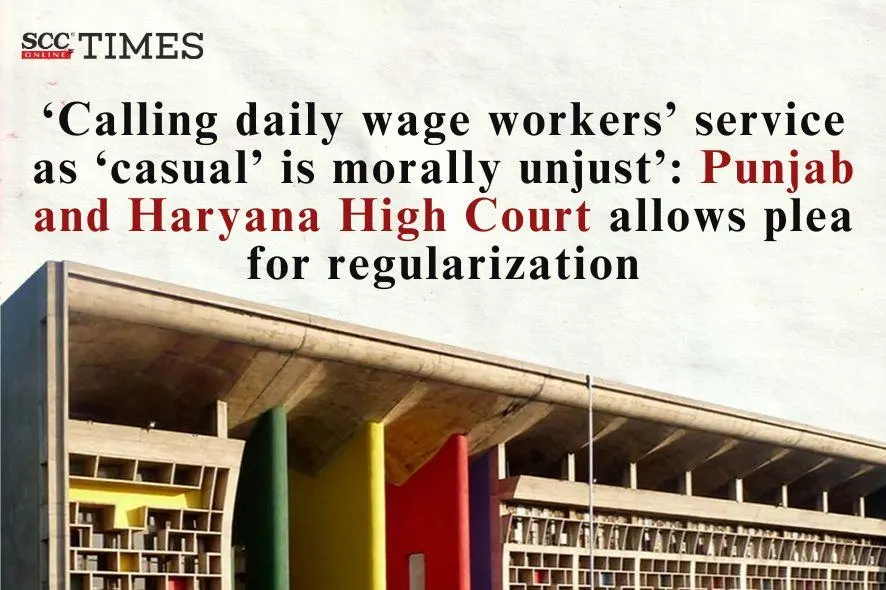Punjab and Haryana High Court: The present petition was filed by daily wage workers (‘petitioners’) under Articles 226 and 227 of the Constitution seeking to set aside order passed by the Bhakra Beas Management Board (‘respondent’) whereby their claim seeking regularization was rejected. A Single Judge Bench of Sandeep Moudgil, J., held that fairness demanded that those who had given a lifetime to public service should not be left stranded in their twilight years with nothing but hope and equity should not be a casualty in the hands of executive convenience. Accordingly, the Court allowed the petition.
Background
Since 1989, the petitioners were continuously working with the respondent, and they performed duties like those of regular employees for over three decades. They had assigned Contributory Provident Fund (‘CPF’) account numbers, with regular deductions being made from their wages, which indicated formal recognition of their long-standing service.
The State of Punjab has issued various policy circulars for regularization in May 2003, March 2011 and May 2011 of ad hoc, daily wage, and other similarly engaged employees. Additionally, the Punjab Ad hoc, Contractual, Daily Wage, Temporary, Work Charged and Outsourced Employees’ Welfare Act, 2016 (‘2016 Act’) mandated regularization of employees who had served continuously for at least three years prior to the 2016 Act’s enforcement.
Despite being eligible under these policies and the 2016 Act, the petitioners’ claims for regularization were rejected by the respondent through speaking orders. Aggrieved by the same, the petitioners challenged these rejections as being arbitrary, discriminatory, and contrary to law, asserting that the respondent was bound by the Punjab Government’s instructions under the Bhakra Beas Management Board Rules, 1974 (‘1974 Rules’), and that their continuous service entitled them to regularization along with all consequential benefits.
The petitioners contended that the respondent possessed the power to relax conditions such as age and qualification in cases of hardship, and their case squarely qualified such relaxation, considering their decades of service. Per contra, the respondent contended that it was a statutory body under the control of the Central Government, and hence, the policies or legislation of the State of Punjab, including the 2016 Act, were not automatically applicable to it. It further contended that the petitioners were never appointed through any sanctioned or regular recruitment process, and thus, had no legal right to seek regularization.
Analysis and Decision
The Court specified that law was not a rigid instrument but a compassionate force that should respond to the human condition. Stating that the petitioners were not faceless names in a file but human beings who had served a public institution with diligence and dignity for over three decades, the Court opined that to ignore this would make justice blind to lived realities.
The Court emphasized that the records revealed that the petitioners had been continuously engaged as daily wage workers with the respondent since as early as 1989 and through sun and storm, they discharged duties akin to those of permanent employees. The Court stated that thus, the law should see through the veil of nomenclature and acknowledge the substance of the relationship and to call such service ‘casual’ was not only factually untenable but morally unjust.
The Court opined that public employment, when prolonged and uninterrupted, should be met with the fairness of due recognition and the petitioners concerned not merely worked but endured and continued to receive meagre wages after decades of service. The Court stated that it was a stark reminder of the systemic inequity that daily wage workers suffered often under the garb of technicalities and institutional inaction.
The Court observed that the respondent’s rejection of petitioner’s claims ignored the humane jurisprudence that those who served the State continuously for over ten years without break should be protected from the injustice of discrimination. Further, the Court stated that to reject the applicability of State Government’s instructions solely on the ground that the respondent fell under the control of the Central Government was erroneous as Rule 6 of 1974 Rules clearly created a statutory bridge between the State’s welfare policies and the employees of the respondent.
Further, the Court opined that equity should not be a casualty in the hands of executive convenience and Article 14 of the Constitution not only demanded equality before law but also fairness in state action and this fairness, in its simplest form, demanded that those who have given a lifetime to public service should not be left stranded in their twilight years with nothing but hope. Accordingly, the present petition was allowed.
[Harbhajan Singh v. Bhakra Beas Management Board, CWP No. 6843 of 2020 (O&M), decided on 9-9-2025]
Advocates who appeared in this case:
For the Petitioners: Ajaivir Singh, Advocate
For the Respondents: Sachin Mittal, Advocate and Arnav Mittal, Advocate








